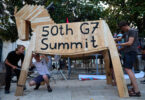Ahead of Sunday’s European election results, attention was understandably focused on the impact of a potential far-right surge on the balance of power in Brussels institutions. In the event, the pan-European centre held, just about, with more moderate conservative parties generally enjoying a good night. But that was not even close to being the main headline of the evening.
Emmanuel Macron’s shock decision to call snap legislative elections, after a humiliating defeat at the hands of Marine Le Pen’s National Rally party (RN), is a gamble of the highest order, taken from a position of weakness. Even by the standards of a president who created his own movement to demolish the traditional centre-left and centre-right, it is a surprisingly risky move. In a Sunday evening address, Mr Macron told the nation that it was a necessary one in order to “clarify” a result that saw the extreme right win a combined 40% of the vote. That clarification, when it comes on 7 July, may or may not be welcome. Mr Macron will hope to call the bluff of a substantial section of the electorate, calculating that voters who cast a protest ballot at the weekend will think again when confronted with the possibility of Ms Le Pen’s protege, Jordan Bardella, becoming prime minister next month. Alternatively, he may believe that a period of “cohabitation” with an RN-led government would usefully demonstrate the radical right’s unfitness for office, spiking its guns before the climactic presidential contest due in 2027. Lacking a majority in the national assembly, Mr Macron may also aspire to unite moderate parties behind him at what one leading politician described as “five minutes to midnight”. A two-round voting system for parliamentary elections – and a higher turnout – at least means that Ms Le Pen’s candidates will have to fight harder for victory than at the weekend.
But in truth no one knows what happens now. As David Cameron discovered after pledging a Brexit referendum, following stellar European results for Nigel Farage’s Ukip in 2014, bold gambits can deliver very nasty surprises. The most likely outcome of Mr Macron’s dice-rolling appears to be an increased RN presence in a fractious, fragmented and paralysed parliament. Such stasis would surely be grist to Ms Le Pen’s mill ahead of 2027. It would also be destabilising for the rest of Europe, after elections that saw radical-right parties top the polls in Italy and Austria, and the AfD finish second in Germany despite being mired in scandal for months. Crucially, mainstream pro-European parties still hold a clear majority in the European parliament, and will control the horse-trading over appointments to the new European Commission. But the weekend’s polls confirmed that Eurosceptic nationalist movements once confined to the margins are becoming normalised and growing in influence. Giorgia Meloni’s Brothers of Italy party, the heir to postwar neo-fascist movements, increased its vote share compared with its winning general election result of 2022.
That performance consolidates Ms Meloni’s position as one of the leading power brokers in Brussels politics. Depressingly, Europe’s rightward lurch on themes such as the green transition and immigration looks set to continue. For the next month, though, all eyes will be on France. In the context of Vladimir Putin’s war in Ukraine and wider geopolitical volatility, Mr Macron has been a vociferous and welcome advocate of a more powerful, united and assertive Europe. He has now chosen to take on Ms Le Pen, who has a history of pro-Putin sympathies and yearns to disrupt the European Union from within, immediately after the biggest victory of her political career. A fateful contest looms not just for France, but for the EU as a whole.







